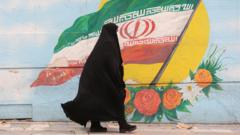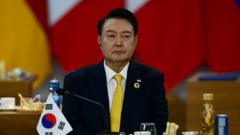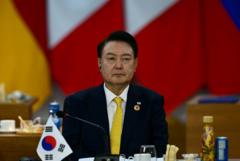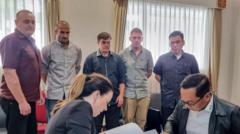President Joko Widodo's transformation of Indonesia from poverty into a developing democracy has been overshadowed by recent controversies over perceived efforts to consolidate power through family connections, leading to widespread protests and calls for accountability.
Joko Widodo's Ambiguous Legacy: Triumphs and Controversies as He Exits Power

Joko Widodo's Ambiguous Legacy: Triumphs and Controversies as He Exits Power
As President Joko Widodo's decade in office comes to a close, his impact on Indonesian democracy faces scrutiny amid allegations of nepotism and political maneuvering.
President Joko Widodo of Indonesia is entering his final days in office after a remarkable ten-year journey marked by significant socio-economic reforms, yet marred by allegations of undermining democracy. With his term concluding, he remains broadly popular, but the divisions among the populace are growing, illustrated by a wave of protests that erupted in August.
The catalyst for these protests was an "emergency warning" that resonated among citizens concerned about the future of their democracy, which emerged from decades of dictatorial rule. Thousands of demonstrators flooded the streets of Jakarta, even breaching the gates of Parliament in a show of indignation aimed at the president's perceived overreach.
During his two terms, Widodo—popularly known as Jokowi—has presided over significant advancements, including the virtual eradication of extreme poverty in the archipelago nation housing approximately 280 million people. However, critics accuse him of compromising democratic principles by facilitating the political ambitions of his family. In a controversial move, he allegedly influenced a Constitutional Court decision that permitted his eldest son, Gibran Rakabuming Raka, to run for vice president. Gibran’s subsequent election alongside Widodo’s chosen successor, Prabowo Subianto, a military figure with a controversial record, further ignited allegations of nepotism.
Adding fuel to the fire was a proposed change in electoral law that would enable Jokowi's younger son, Kaesang Pangarep, to participate in local elections. This plan incited outrage, contradicting Jokowi’s prior commitment against nepotistic power transfers within his family.
As protests escalated, personal attacks on Jokowi intensified, with social media users resorting to his birth name, Mulyono, a name laden with cultural significance suggesting misfortune. The public's disillusionment reflects a desire for transparency and adherence to democratic principles, calling into question the legacy of a leader who promised to break from the past but is now accused of perpetuating its shadows.
As Jokowi prepares to exit the political stage, the Indonesian people face a pivotal moment, weighing the transformative policies implemented under his leadership against the emerging concerns regarding the integrity of their democracy.




















